Unit 2 A History of the United Kingdom
高中英语 Unit 2 The United Kingdom 英国伦敦塔

浙江省诸暨市草塔中学高中英语 Unit 2 The United Kingdom 英国伦敦塔素
材新人教版必修5
1066年,诺曼底的公爵、征服者纪尧姆在黑斯廷战役中击败了萨克逊的国王哈曼德以后,成为英国国王。
随即,他下令修筑要塞,以捍卫他的新王国的要紧城市伦敦。
十年以后,他决定将土木结构的这座一般的城堡(位于塔米斯河畔)改建成宏伟的要塞式的宫殿,还修建了一个被称为伦敦塔的高塔。
后来,当城堡被扩建后,那个名字就给予了逐个要塞,中央的高塔因白塔那个名字更是众所周知,因为建设时利用了白得耀眼的石灰石。
白塔的西侧有四座小塔楼,其中的一个是圆形的。
人们以为这座塔楼依照鲁昂的诺曼底公爵之塔(建于十世纪,毁于1204年)的样子建造的。
塔中有伦敦最古老的教堂—圣·让小教堂。
伦敦塔是皇家的官邸和武器库,从亨利八世(十六世纪)起,它变成了国家的重要牢狱。
亨利八世的第二位王后安娜·博林、第五位王后卡瑟琳·霍华德、托马斯·莫尔及爱德华四世的两个儿子确实是死在那个地址的不幸的囚犯的成员,他们为该塔的凄惨名声作出了奉献。
今天,参观的人们能够在那个地址欣赏王室的珠宝和武器博物馆。
Unit-2-The-United-Kingdom教学案
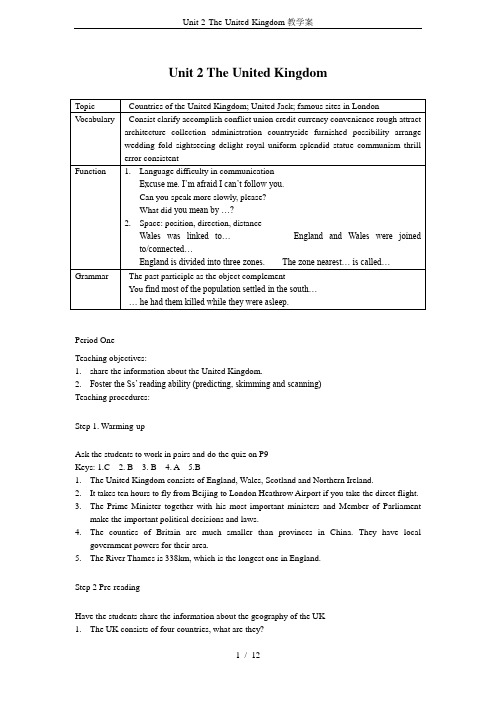
Unit 2 The United KingdomTopic Countries of the United Kingdom; United Jack; famous sites in LondonV ocabulary Consist clarify accomplish conflict union credit currency convenience rough attract architecture collection administration countryside furnished possibility arrangewedding fold sightseeing delight royal uniform splendid statue communism thrillerror consistentFunction nguage difficulty in communicationExcuse me. I’m afraid I can’t follow you.Can you speak more slowly, please?What did you mean by …?2.Space: position, direction, distanceWales was linked to… England and Wales were joinedto/connected…England is divided into three zones. The zone nearest… is called…Grammar The past participle as the object complementYou find most of the population settled in the south…… he had them killed while they were asleep.Period OneTeaching objectives:1.share the information about the United Kingdom.2.Foster the Ss’ reading ability (predicting, skimming and scanning)Teaching procedures:Step 1. Warming-upAsk the students to work in pairs and do the quiz on P9Keys: 1.C 2. B 3. B 4. A 5.B1.The United Kingdom consists of England, Wales, Scotland and Northern Ireland.2.It takes ten hours to fly from Beijing to London Heathrow Airport if you take the direct flight.3.The Prime Minister together with his most important ministers and Member of Parliamentmake the important political decisions and laws.4.The counties of Britain are much smaller than provinces in China. They have localgovernment powers for their area.5.The River Thames is 338km, which is the longest one in England.Step 2 Pre-readingHave the students share the information about the geography of the UK1.The UK consists of four countries, what are they?England, Scotland, Wales, Northern Ireland2. Can you name the capital cities of the countries of the UK?London, Edinburgh, Cardiff, BelfastStep 3 Reading1. Fast-readingAsk the students to read the map and the text on P10 and answer the following the questions1) The Union Jack flag unite the flags of three countries in the United Kingdom. Whichcountry is left out? Why?Wales. It is usually considered to be part of the England.2) What three countries does British Airways represent?England, Scotland and Wales3) Wh ich group of invaders didn’t influence London?The Vikings didn’t influence London.2. Text structure analysis Have the students find out the topic sentences of each paragraph1st paragraph Why are different words used to describe England, Wales, Scotland andNorthern Ireland?2nd paragraphFirst there was England. 3rd paragraph Great Britain was the name given when England and Wales were joined toScotland.4th paragraph The four countries are still very different. 5th paragraphEngland is the largest of the four countries. 6th paragraph The greatest historical treasure of all is London.Ask the students to divide the passage into three parts and write down the main idea of each part Part1 (para1-4) What the UK includes and how the UK formed and more detailed information about the four countries in the UKPart2 (para5) The geographical division of England into three zones: their similarities and differencesPart3(para6) The cultural importance of London3. Careful reading1. Have the students put the events happening to the form of the UK into the right order.2. Have the students identify the invaders and their influences on The United Kingdom —the UK. First there was England. In the 13th century AD, Wales was linked to England. In 1603 England and Wales were joined to Scotland. The name Great Britain came into being.Three centuries later Northern Ireland joined with England, Wales and Scotland to becomethe United Kingdom.The Romans in the 1st century AD The Anglo-Saxons in the1060sThe Vikings The NormansTowns and roads Language andgovernment V ocabulary andplace-namesCastles and words for food3. Have the students look at the map of England and Wales. Draw lines across to show the zones of the South, Midlands and North of England.North: Leeds, York, Sheffield, and ManchesterMidlands: Coventry, BirminghamSouth: Reading, London, Brighton, PlymouthStep 4 SummaryHave the students use the information to write a short summary of the passagePossible version: The writer examines how the UK developed as an administrative unit. It shows how England is also divided into three zones. It explains why London became the cultural capital of England.Period Two & ThreeLanguage pointsWarming upConsist of 由…组成,由….构成(不用进行时)The team consists of one hundred men and women athletes.=The team is made up of one hundred men and women athletes.There is a big family, consisting of ten people.Consist in 在于,决定于(不用被动态)= be based on/ depend on/ uponWhat does happiness consist in? 什么才算是幸福?The beauty of the town consists in the style of its ancient buildings.Pre-readingdivide “把…..分成;分开”指将一个整体分成若干部分,常与介词between ,among, by ,into 等搭配He divided the cake into three= The cake was divided into three.Divide this line into 20 equal parts. Divide this line in half.We’ll have to divide the work between (among) us.6 divided by 3 is 2.separate 多指把原来连在一起或者是靠近的人或事物分离开,常与介词from, by 搭配The Channel separates England from France.The two towns are separated by the river.She doesn’t want to be separated from this man.I have got separated from him for a couple of years. 分开,分居Reading1.puzzle n something that is difficult to understand or explain 难题,迷/ 益智玩具(游戏)Programming is really a puzzle to me. 我搞不懂编程。
Unit-2-The-United-Kingdom教案

Unit 2 The United Kingdom Ⅰ. 单元教学目标Ⅱ. 目标语言Ⅲ. 教材分析与教材重组1. 教材分析本单元以The United Kingdom为中心话题。
通过学习,使学生了解英国的历史、地理、政治、文化、宗教、社会习俗及名胜古迹等有关知识。
1.1 Warming Up 通过一个小测试考查学生对英国的了解情况。
1.2 Pre-reading通过三个有关英国的小问题,让学生进一步加深对英国的了解。
1.3 Reading本单元的阅读材料——PUZZLES IN GEOGRAPHY(“地理之迷”),从地理、历史、政治、文化、体育等方面简要介绍了联合王国的形成和发展、风土人情和人文景观。
1.4 Comprehending通过回答问题、解析地图中的信息、划分课文段落写出大意以及归纳课文内容写出小结等练习,加强学生对课文深层次的理解,培养学生归纳、概括、总结能力。
Ⅳ.HOMEWORK1.Recite the new words in the text2.Do excrise 1.2附件1. The history of the national flag of the UKEnglish flag was created by King James Ⅵ of Scotland. In 1603, he became the King of England. He was the first king to unite England and Scotland. He combined England’s Red Cross of St. George with Scotland’s White Cross of St. Andrew. The White Cross of St. Andrew stood for patron saint(保护神)of Scotland, while the Red Cross of St. George stood for patron saint of England. This was the flag that flew above all the early English settlements in the new world. It was the most commonly used flag in the English colonies. In 1801 King George Ⅲ added to the flag the Cross of St. Patrick, patron saint of Ireland. English flag was generally referred to as the “Union Jack”. The flag has remained the same.2. The custom and tradition of the UK“Ladies First” is a British custom, though it is less obs erved today than it used to be. The reason seems to be the fact that women are the equals of men in having the votes, taking paid jobs and receiving higher education, but there is still the feeling that they need protecting. It is still considered necessary to observe this tradition. In Britain, a man should let a woman go first, and protect her from traffic. On a bus, men should be initiative to give their seats to women, help women get on and off the bus. In a lift, a man should take off his cap when there is a woman. When going into or out of a room, men should be initiative to help women take off or put on their outerwear.When dining with a lady, a man should offer her a better seat so that she can easily overlook the outer door scene or view of the whole restaurant. At the very first meeting, men should be introduced to ladies first.3. The character of the BritishThe best-known quality of the British people and, in particular, of the English people is their exclusiveness. This means, “I am English. Y ou stay away from me. I am exclusive. I am quite happy to be myself. I do not need you. Leave me alone.” It is very difficult to know such a man who does not talk much, never says anything about himself, does not show much emotion and hardly ever gets excited.The English people are generally regarded as conservative. The Americans say that the English people always need 20 or 40 years to do things that they do today because the English people are so conservative that they have to wait for a long time before they are prepared to try something new. Englishmen think their way of doing things is always the best, and always the most normal.The right to privacy and personal freedom is unquestioned by the British. Perhaps it is the lack of space that has fostered and maintained their fierce individualism. There is a com mon saying among the British people, “My home is my castle. The wind can come in, but the Kings and Queens and human beings can never come in without my permission.”4. The climate in the UKIt is well-known that the English always go out with an umbrella or a raincoat. Why? It is because the weather in Britain often changes quickly. It is not very common for the same kind of weather to stay long.Spring can be rainy or windy, but the weather is getting warmer and you can expect more sunny days. In fact there can be as much sunshine in spring as in summer. May is very often a lovely warm month in many parts of Britain. Parks, gardens and the countryside are green and full of flowers, so people can have a lot of things to do and enjoy themselves outdoors at this time of a year.Summer is the most popular time for visitors to go to the seaside and other scenic spots. The weather can be sunny and pleasant. People usually have outdoor activitiessuch as swimming and outing.Autumn is a beautiful season, with tree leaves in the woods and parks changing to brown and red. It is a bumper crop season of agricultural plants. It is pleasant to be outside though the weather is constantly changing.It’s co ld in winter. It might snow, especially on high land in the north. Sometimes there are also storms and strong winds in the season.January and February are the coldest months of the year, while the warmest are often July and August. The difference in temperature between winter and summer is not so great. The average temperature for winter is about 4.5℃ and for summer about 15.5℃. How interesting it is!5. Buckingham PalaceThroughout the centuries, Britain’s kings and queens have built or bought palaces to serve as family homes, workplaces and centres of government.Buckingham Palace has served as the official London residence of Britain’s sovereigns (君主统治) since 1837. It evolved from a town house that was owned from the beginning of the eighteenth century by the Dukes of Buckingham. Today it is The Queen’s offic ial residence. Although in use for the many official events and receptions held by The Queen, areas of Buckingham Palace are opened to visitors on a regular basis. The State Rooms of the Palace are open to visitors during the Annual Summer Opening in August and September.The residences associated with today’s Royal Family are divided into the Occupied Royal Residences, which are held in trust for future generations, and the Private Estates which have been handed down to The Queen by earlier generations of the Royal Family.6. ScotlandScotland lies to the north England. The country has lots of mountains in the north, but the east coast is rather flat. There is little agriculture in the north and west. Although the farmers can keep sheep on the hills in summer, they also shoot wild deer for food. There are a good many lakes and rivers. Visitors go to Scotland for their holidays to catch fish; there are also a lot of fish farms.Scotland is famous for its engineers. In the past, people from Scotland traveled abroad to build bridges, railways and roads. Ships were built on the coast, too. Now, however, the work has changed. Many foreign companies have built factories in south Scotl and where they make computers. Most Scots speak “Scottish English”. They use many different words.Edinburgh has been called “the Athens of the North”. Like Rome, it was built on seven hills. It is one of the cultural centers of Europe. It may not have the summer sunshine of a Mediterranean city, but Scotland’s capital still draws lots of visitors from all over the world.The best place for a tourist to begin touring the city is probably Edinburgh Castle, which looks out over the city from the high Castle Rock. The Rock provides wonderful views of the city and the land around it. It is not difficult to see why this is the place where Edinburgh’s history began.The Royal Mile in Edinburgh is a row of historic streets that have some of the most beautiful ol d buildings in Europe. It runs from the Castle to one of Edinburgh’s other main buildings. Through the years, the city government has helped this area keep its traditional character.Today, Edinburgh is famous for biggest arts festival on Earth. The Edinburgh Festival, which begins in August every year, brings musicians, singers and dancers and theater groups from all over the world. Besides the formal performances, there is the Festival Fringe. For three weeks, Edinburgh’s streets are alive with fire-eaters and all kinds of strange and wonderful acts.7. A short history of IrelandThe island of Ireland is located off mainland Europe to the west and is part of a group of islands, which used to be known as the British Isles. But since the Irish Republic gained its independence in 1922, the term British and Ireland has come into use and is more as Cocles in the Republic.The English invaded Ireland in 1171 and ruled the country for centuries. Ireland became part of the United Kingdom in 1801, but it soon grew discontented, and for forty years the “Irish Question” was the great headach e of the British Parliament. In1845, a disease infected most of Ireland’s potatoes and caused a famine (饥荒) that lasted four years. More than one million Irish people died from starvation and disease. Another million or so left Ireland for countries like the US and Australia.The island is divided into two separate political entities, originally created in the 1920s. Covering three-quarters of the island, and containing twenty-six counties, the southern state officially became Republic of Ireland in 1949 some time after it became independent from the UK in 1922 (first called Eire). The remaining six-county state covering the northeast corner of the island is called Northern Ireland and is part of the UK.。
高二英语新人教版必修5:Unit2《TheUnitedKingdom》(第3课时)同步练习 版含听力

人教版必修五Unit 2 The United Kingdom3. Grammar: 过去分词作宾语补足语一、单句语法填空。
在每句空白处填入适当的内容或括号内单词的正确形式。
1.While you are out, you should keep your doors and windows ______(close).2.Michael put up a picture of Yao Ming beside the bed to keep himself ______(remind) of his own dreams.3.With the rapid development of communication, now all fishing boats are ______ (equip)with radio.4.He opened the envelop, had it_____(unfold) and began to read it.5.LiPing stood silently with her arms ________(fold).6.The foreigner explained again and again but he still couldn’t make himself ______(understand).7.The room was _______________(furnish) with the simplest essentials: a bed, a chair and a table.8.The manager arranged _____ meet the customer who complained the next day.9.The two office buildings look ___________ in size and shape.10.You ought to (should) be patient and keep calm lest you should quarrel_____ him.二、完形填空阅读下面短文,从短文后各题所给的四个选项(A、B、C和D)中,选出可以填入空白处的最佳选项。
人教版高中英语必修五 Unit2 The United Kingdom-词汇篇(学生版)
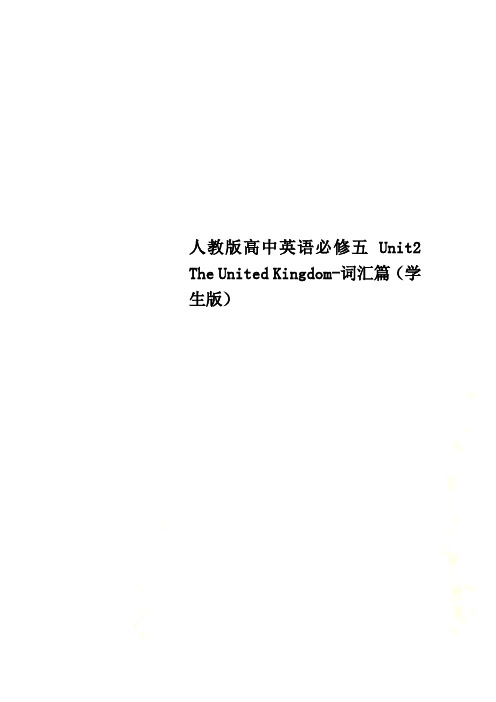
人教版高中英语必修五 Unit2 The United Kingdom-词汇篇(学生版)Unit2 The United Kingdom-词汇篇____________________________________________ __________________________________________________________________________________ ______________________________________1.掌握重点词汇的搭配及用法,能够正确完成基础类型题。
2.掌握重点句型的用法,会模仿句型进行写作和翻译。
◆重点词组:1. keep your eyes open 睁大你的眼睛2. consist of由…组成3. leave out省去不考虑遗漏4. divide into 分成5. prepare to 准备6. compare A with B 与…比7. compare A to B 把A比作B8. asked the boss on the phone 通过电话9. work out 做出;解决;设计出;计算出;锻炼;发展,进行;work on对..起作用;企图影响或说服,忙于work in 在…工作Keys: 1) the team consists of 12 players.2)The beauty of the artist's style consists in its simplicity.2. 区别: Ø separate ... from (把联合在一起或靠近的人或物分离出来)Ø divide...into 把…分开(把整体分为若干部分)e.g. The teacher divided the class into two groups.e.g. The Taiwan Strait separates Taiwan from Fujian.3. debate about sth.e.g. They debate about the proposal for three days. ★ debate/argue/discuss/quarrel辩论,争论【解析】debate就已经确定或统一的问题,各述己见,公开,正式的争论.含交锋的意思;argue指提出理由或事实,试图在争辩中说服对方,或促使他人拥护自己倡导的理由或观点;discuss指一般讨论,谈论;quarrel常指因琐事而感到气愤,进行争吵【练习】选择debate/argue/discuss/quarrel或puzzle并用其适当的形式填空1)The couple are always __________quarreling about the past.2)Have you _________ the problem with anyone? 3)I _________ with her all day about the situation. Keys: 1)quarreling 2)discussed 3)argued 4. clarify: vt./vi. (cause sth. to )become clear or easier to understand 澄清;阐明;清楚;明了e.g. I hope what I say will clarify the situation.e.g. Can you clarify the question?5. be linked to = be connected to /be joined to 连接【习惯用语】★ link A to B 将A和B连接起来6. refer to1)提及,指的是……e.g. When he said “some students”, do you think he was referring to us?2) 参考;查阅;询问e.g. If you don't understand a word you may refer to your dictionaries.e.g. Please refer to the last page of the book for answers.3) 关系到;关乎e.g. What I have to say refers to all of you.e.g. This rule refers to everyone.★ reference: n. 参考e.g. reference books 参考书7. to one's surprise (prep)“to one’s +名词” 表“令某人……”,常见的名词有“delight, disappointment, enjoyment, astonishment 等。
高中英语 Unit2 The United Kingdom--period1教案 新人教版必修5 教

Unit 2 The United Kingdom教学资源说明Section 1 Background 背景围绕单元话题“联合王国”我们提供了若干实用性背景材料。
这些材料既可以作为教师教学参考材料为教师所用,也可以直接或改写、重组后作为课堂内外的拓展性阅读材料呈现给学生。
Section 2 Explanation 解析重点针对“阅读课型”中的课文难句,我们提供了详尽的,就句论句的解析和翻译,并且以解析的焦点话题为线索,进行了一定的归纳、辨析和总结,以帮助教师更好地实施“语言形式”的教学。
Section 3 Vocabulary 词汇按照课本单元词汇表顺序,我们重点提供动词、短语搭配的讲解。
所提供的例句,经典、地道、实用、易懂,完全可以直接用于教学。
第三部分教学测评说明围绕单元词法、句法项目,我们提供了长短不一的“单元教学测评”,并备有参考答案供教师使用。
有些测评题目直接源于历年高考试卷,更具有说服力和实用性。
Part 1 Teaching Design第一部分教学设计Period 1 A sample lesson plan for reading(PUZZLES IN GEOGRAPHY)IntroductionIn this period, after the warming up, students willfirst be guided to answer questions about UK. Then theyshall be helped to read the text Puzzles in geographyby the following procedures: reading aloud the text,reading and underlining, reading and circling, readingfor type of writing and summary of the ideas, makinga chain of events happening to The United Kingdom—the UK, reading to list invaders and their influences on The United Kingdom—the UK, transforming information. And the period will be closed down by students taking a quiz.Objectives■To help students learn to see language difficulties in munication■To help students learn to read an exposition about the UK■To help students better understand “the UK”■To help students learn to use some important words and expressions■To help students identify examples of “The past participle <2>as the object plement” in the textFocusAidsMultimedia facilities, tape-recorder, photos, diagramsProcedures1. Warming up⑴Warming up by sharing informationToday we are to learn about the United Kingdom. What do you know about it?Look at the photos and listen to me telling you about it.⑵Warming up by brainstormingGood morning, class. We shall take Unit 2 The United Kingdom today. But first let’s have a brainstorming. What occur to you ifyoue cross the United Kingdom?⑶Warming up by watching a video showHello, class! I am your travel guide today. We shall go to visit London for this weekend. Now let’s watch a video show about London attractions first. You may alsoread the caption in English.(For detailed information, go to: )2. Pre-reading by answering questionsSince you have learned something about the U.K., you are to answer the three questions about her on page 9.3. Reading⑴Reading aloud the textNext we are to read aloud the text to the recording. Pay attention to the pauses found in the sentences. You may slash the sentences into parts, that is, the sense groups.⑵Reading and underliningYou are to read the text the second time. This time you have to underline all the expressions found in the sentences. Copy them into your Expression Book after school and write a short passage, making use of the expressions.⑶Reading and circlingNext you are to read the text once again to circle all the cohesive words used to link the sentences and paragraphs together.⑷ Reading for type of writing and summary of the ideas⑸ Making a chain of events happening to The United Kingdom—the UK⑹ Reading to list invaders and their influences on The United Kingdom—the UK⑺Transforming informationYou are to go over the text again to look for any necessary information to pletethe form below.4. Closing down by taking a quiz。
高考英语 Unit 2 The United Kingdom 新人教必修5【高考复习课件】

(2)我暂时代理班长的职务。 I'll t_a_k_e_t_h_e_m__o_n_it_o_r'_s_p_l_a_ce_/_ta_k_e__th_e__p_la_c_e_o_f__th_e_m__o_n_i_to_r_for a while.
3.leave out 省去;遗漏;不考虑 例句 She left out the date on the cheque.支票上她漏写了日 期。 拓展 leave...alone 丢下……不管;不理会
leave...behind 遗留;忘记携带;留下 leave behind 落后 leave for 前往某地
运用 完成句子 (1)这个俱乐部由大约 50 名会员组成。
This club __co_n_s_i_s_ts_o_f_ about 50 members. (2)理论应与实践相一致。
Theory should _c_o_n_si_s_t_w_i_th_/_b_e_c_o_n_s_i_st_e_n_t_w_i_th_ practice. (3)这个计划妙就妙在简明扼要。
(1)I will add them to my stamp_c_o_l_le_c_t_io_n_. (2)He returned to_c_o_l_le_c_t_ his money.
4.quarrel n.争吵;争论;吵架 vi.争吵;吵架 例句 The twin sisters always quarrel with each other. 这对双胞胎姐妹老是吵架。 搭配 quarrel with sb.与某人吵架/争论 quarrel about/on sth.为……争论/争辩 be under quarrel 在争论中 运用 完成句子
人教版高中英语必修五Unit2TheUnitedKingdom知识讲解
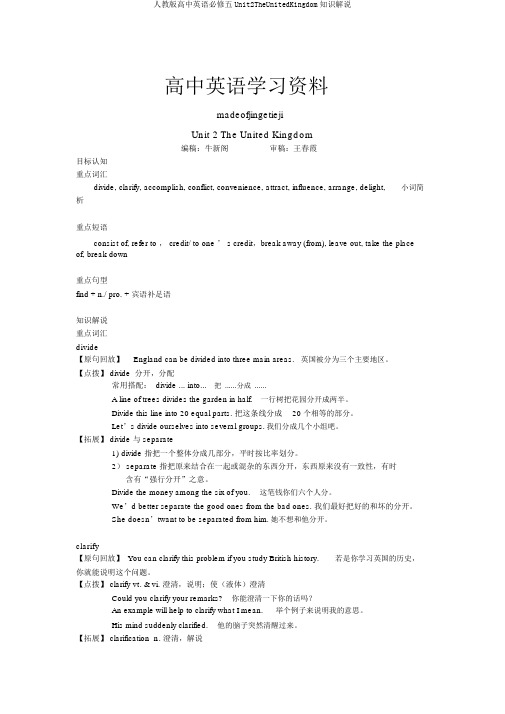
高中英语学习资料madeofjingetiejiUnit 2 The United Kingdom编稿:牛新阁审稿:王春霞目标认知重点词汇divide, clarify, accomplish, conflict, convenience, attract, influence, arrange, delight,小词简析重点短语consist of, refer to , credit/ to one ’ s credit,break away (from), leave out, take the place of, break down重点句型find + n./ pro. + 宾语补足语知识解说重点词汇divide【原句回放】England can be divided into three main areas.英国被分为三个主要地区。
【点拨】 divide 分开,分配常用搭配: divide ... into...把......分成......A line of trees divides the garden in half.一行树把花园分开成两半。
Divide this line into 20 equal parts. 把这条线分成20 个相等的部分。
Let’s divide ourselves into several groups.我们分成几个小组吧。
【拓展】 divide 与 separate1)divide 指把一个整体分成几部分,平时按比率划分。
2) separate 指把原来结合在一起或混杂的东西分开,东西原来没有一致性,有时含有“强行分开”之意。
Divide the money among the six of you.这笔钱你们六个人分。
We’d better separate the good ones from the bad ones. 我们最好把好的和坏的分开。
高中英语必修五Unit2The United Kingdom要点解析
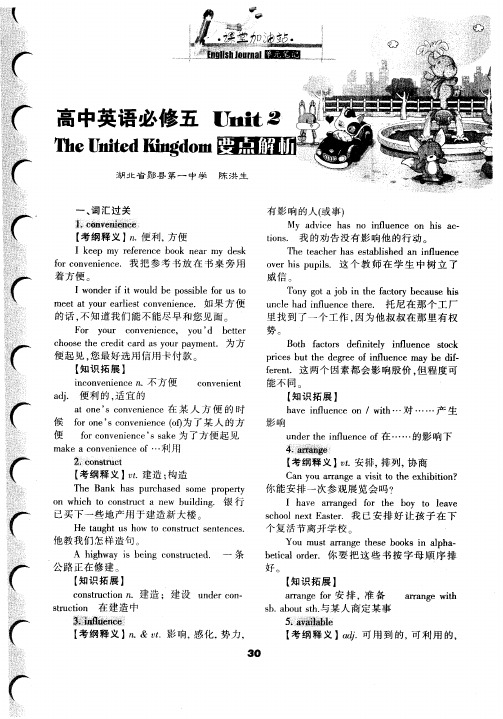
t n. 我的劝 告没有 影 响他 的行动 。 is o
T e ta h r h s e tb ih d a n u n e h e c e a s l e n if e c a s l
fr o vne c.我 把 参 考 书放 在 书 桌 旁 用 o n ein e c 着方便 。
B t f co s ei i l ifu n e t c o h a t r d f t y n e c s k n e l o p c s b tt e d g e fi u n e ma e d f i r e u e r e o n e c y b i h l f -
c os ece icr s o r a m n. 为 方 hoet rdt ada u y e t h y p
便 起见 , 您最好 选用 信用 卡付款 。 【 识拓 展 】 知
icn e i c . 方便 c ne in n o vne en 不 n o vne t 便利 的 , 适宜 的 a o e sc ne in e在 某 人 方 便 的 时 t n ’ o vne c
4 . j 【 考纲 释义 】 t 安排, 列, 商 v. 排 协
C n y u a n eavs otee h bt n a o  ̄a g i tt h x iio ? i i
【 考纲释 义 】 t建 造 ; v. 构造
T e B n a u c a e o r p ry h a k h s p r h s d s me p o e t
他 教我们 怎样造 句 。
A hg w y i b igcnt c d 一 条 i a s e o s u t . h n r e
公路 正在 修建 。
人教版高中英语必修五Unit 2The United Kingdom课件

(2)Success consists in
the ability to continue efforts
through failures.(2014·福建,书面表达)
成功在于在失败中还能继续努力的能力。
(3)Theory should consist with practice. 理论应与实践相一致。
Unit 2 The United Kingdom
必修 5
Unit 2 The United Kingdom
基础分级
核心考点
随堂特训
-3-
Ⅰ.单词 由简到难,水到渠成 The first step is as good as half over.
【识记阅读单词】 1.kingdom n.王国 2.province n.省;行政区 3.clarify vt.澄清;阐明 4.conflict n.矛盾;冲突 5.union n.联合;联盟;结合;协会 6.credit n.信任;学分;赞扬;信贷 7.currency n.货币;通货 8.institution n.制度;机制;公共机构 9.nationwide adj.全国性的;全国范围的 10.architecture n.建筑学;建筑艺术
必修 5
Unit 2 The United Kingdom
基础分级
核心考点
随堂特训
-8-
ቤተ መጻሕፍቲ ባይዱ
1.-cy后缀高频词汇 accuracy准确性 emergency紧急情况 frequency频率 tendency趋势 agency代理机构 currency货币;通货 mercy仁慈;宽恕;怜悯 2.由statue想到的 statue雕像 status身份;地位 state(政治上所指的)国家;状态 stout肥胖的;强壮的
人教新课标高二必修5Unit2TheUnitedKingdom单元复习课件
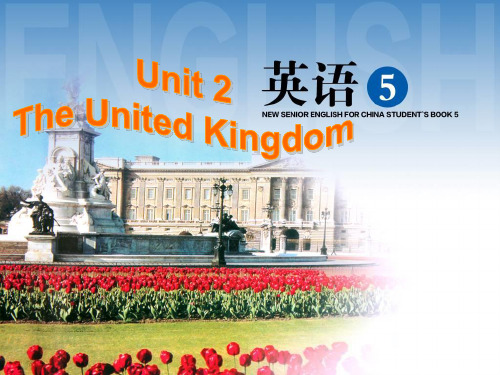
【归纳】 ① for (the sake of) convenience 为了方便
起见 ② at one’s convenience 在某人方便时 ③ for the convenience of 为了方便…… ④ to one’s convenience 对某人方便(合适)
【拓展】 ① convenient adj. 方便的; 便利的
not attract visitors. 语 法 过去分词作宾语补足语
(一) 基本单词 1. __c_la_r_i_fy_____ vt. 澄清; 阐明 2. _a_c_c_o_m_p_l_is_h__ vt. 完成; 到达; 实现 3. __co_n_f_l_ic_t____ n. 矛盾; 冲突 4. __co_n_s_i_s_t ____ vi. 组成; 在于; 一致 5. __p_l_u_s______ prep. 加上; 和
I'm _s_ee_k_i_n_g__c_la_r_i_fi_c_a_ti_o_n_o_f_/_o_n___ the
regulation.
2. conflict n.&vi. 斗争; 冲突
(课文原句) Happily this was accomplished without conflict when King James of Scotland became King of England and Wales as well. 翻译:令人庆幸的是,当英格兰的詹姆 斯国王成为英格兰和威尔士的国王时, 这三个国家和平的实现了联合。
选用上述词汇完成下列情景。 Yesterday I received a letter from my former teacher. He asked me if it would be _c_o_n_v_e_n_ie_n_t___ for him to come to my home this weekend. Of course I replied to him quickly that he could come at his _c_o_n_v_e_n_ie_n_c_e__. Besides, I told him that if _c_o_n_v_e_n_ie_n_t__, I’d like to pay him a visit because it was really _c_o_n_v_e_n_ie_n_t_ to go to Beijing nowadays.
Unit2 《The United Kingdom》教案

Unit2 《The United Kingdom》教案Unit2TheUnitedkingdomTeachingGoals:1.Getthestudents toknowtheinformationabouttheUnitedkingdom.2.Encoura gethestudentstotalkoutwhattheyknowabouttheUkandIrel and.3.Helpthestudentslearntogetinformationbylisteni ng.Teachingmethods1).Skimming&scanningmethodsto maketheSsgetagoodunderstandingofthetext.1.DiscussionmethodstomaketheSsunderstandwhatthey’velearnedinclass.2.Pairworkofgrouptogeteverystudenttotakepartintheteac hing-and-learningactivities.3.competitionandrole-playmethodtoarousetheSs’interestTeachingproceduresPeriod1Step1.Newwordsstud y.GetSsreadthenewwordsfromP93-94bythemselves.Ssread thenewwordstogether.Tcorrectsomemis-pronounciationf orthestudents.Step2IntroductionoftheUk.Area:244,820sq.km.Population:59,113,439Languages:English,kymric,GaelicReligion:catholicismcomposingcountries:EnglandwalesScotlandNorthernIrelandcapitals:LondoncardiffEdinburghBelfastStep3.warmingup.:Sscompeteinansweringtheques tionsasquicklyaspossible.Step4Pre-reading.Q:England canbedividedintothreemainareas.Doyouknowwhattheyare?Thesouth,themidlandsandthenorthStep5Fastreading.Ssr eadthepassagewithin4minutestofindtheanswerstocompre hending1.1TheUnionjackflagunitestheflagofthreecountriesintheU nitedkingdom,whichcountryisleftout?why?Thecountryle ftoutiswales.ItisusuallyassumedtobepartofEngland2whatthreecountriesdoesBritishAirwaysrepresent?1Engl and2.Scotland3NorthernIreland3whichgroupofinvadersdidnotinfluenc eLondon?TheVikingsdidn’tinfluenceLondon,itinfluencethevocabularyoftheNorth .Period2Step1:IntensiveReading.SsReadthetextcareful lyanddividethepassageintothreeparts.writedownthemai nideaofeachpart.Part1:whatEnglandincludes;aboutGrea tBritain;theUk.Part2:thegeographicaldivisionofEngla ndintozones;theirsimilaritiesanddifferences.Part3:t heculturalimportanceofLondon.Step2.Teachingnewwords andstructures1.consistvi.组成;在于;存在于常用搭配:consistof=bemadeupof由……组成;由……构成Eg.TheteamconsistsoffourEuropeansandtwoAmericans.Thecommitteeconsistsofsevenmembers.consistin=liein 在于;存在于eg.whatdoeshappinessconsistin?ThebeautyofVeniceconsistinthestyleofitsancientbuild ings.2puzzle1)n.迷;难题;玩具;迷惑(只用单数)achinesepuzzle(中国玩具)【比喻】复杂难懂之事across-wordpuzzle(纵横填字游戏)常用搭配:beinapuzzleabout对……大惑不解Iaminapuzzleaboutthematter.我对这件事大惑不解。
英语必修5unit2theunitedkingdom知识点剖析(人教新课标)
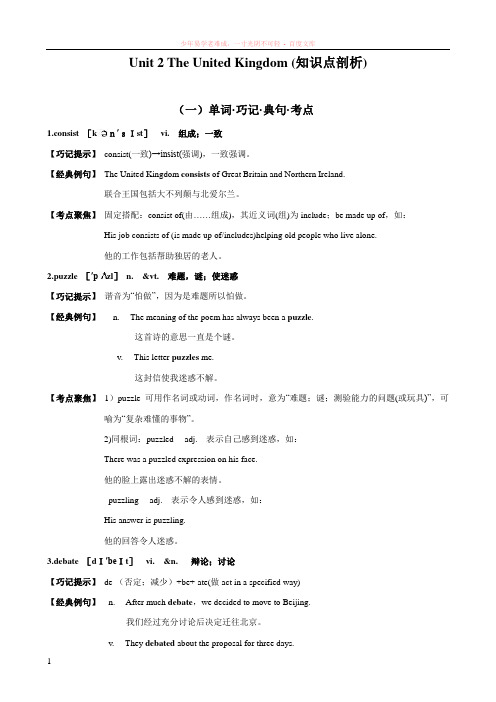
Unit 2 The United Kingdom (知识点剖析)(一)单词·巧记·典句·考点1.consist [kn′sIst]vi.组成;一致【巧记提示】consist(一致)→insist(强调),一致强调。
【经典例句】The United Kingdom consists of Great Britain and Northern Ireland.联合王国包括大不列颠与北爱尔兰。
【考点聚焦】固定搭配:consist of(由……组成),其近义词(组)为include;be made up of,如:His job consists of (is made up of/includes)helping old people who live alone.他的工作包括帮助独居的老人。
2.puzzle [′p zl]n.&vt.难题,谜;使迷惑【巧记提示】谐音为“怕做”,因为是难题所以怕做。
【经典例句】n. The meaning of the poem has always been a puzzle.这首诗的意思一直是个谜。
v. This letter puzzles me.这封信使我迷惑不解。
【考点聚焦】1)puzzle可用作名词或动词,作名词时,意为“难题;谜;测验能力的问题(或玩具)”,可喻为“复杂难懂的事物”。
2)同根词:puzzled adj.表示自己感到迷惑,如:There was a puzzled expression on his face.他的脸上露出迷惑不解的表情。
puzzling adj.表示令人感到迷惑,如:His answer is puzzling.他的回答令人迷惑。
3.debate [dI′beIt]vi.&n.辩论;讨论【巧记提示】de-(否定;减少)+be+-ate(做act in a specified way)【经典例句】n. After much debate,we decided to move to Beijing.我们经过充分讨论后决定迁往北京。
高中英语Unit2 The United Kingdom文章 白金汉宫人教版必修五

白金汉宫白金汉宫(Buckingham Palace)是英国君主的官邸。
它的建筑风格为新古典主义, 主体建筑为五层, 其中两层为服务人员使用的附属层, 高度较低。
所以立面可以视为纵、横三段式处理。
白金汉宫的附属建筑包括皇家画廊、皇家马厩和花园。
皇家画廊和皇家马厩均对公众开放参观, 每年夏天,英国王室在花园内举办盛大的皇家招待会。
除此之外, 来英国做国事访问的国家元首也在宫内下榻。
白金汉宫的广场中央耸立着维多利亚女王纪念碑,顶上站立着展翅欲飞的金箔包裹的胜利女神,而纪念碑正面那么端坐着握着权杖的维多利亚女王。
在这个纪念碑的下方有阶梯, 许多游人在此落座,因为它是打量白金汉宫的最正确位置。
附近地铁站: Victoria 站, Hyde Park Corner 站或Green Park 站,步行穿过公园既是。
公共汽车路线有: 9, 10, 14, 38, 73 等。
唐宁街十号(10 Downing Street)是英国首相官邸,(1735年即成为首相府) 既是世界最知名的政府首脑所在地之一,也已成为伦敦一个重要的旅游景点。
议会大厦(The UK Parliament)英国议会所在地。
曾为英王室居住的西敏寺宫, 1515年被大火焚毁。
1547年修复后,爱德华六世把该宫的部分建筑拨给下院使用。
1838年该宫又毁于大火, 只剩下西敏寺大厅。
1840年重建西敏寺宫,即现在的议会。
1852年,维多利亚女王主持揭幕典礼。
该建筑包括护宫河,总面积为12。
5亩。
大本钟(Big Ben)是英国最著名的地标, 与英国国会大厦相连。
大本钟因其走时准确而名扬四海。
每隔一小时,大钟根据格林威治时间发出沉重而铿锵的响声, 在数英里之外也能听到钟声的回荡。
蜡像馆(Madame Tussauds)--杜瑟夫人蜡像馆, 号称世界同类展览馆中规模最大, 1835年由来自法国的杜瑟夫人创办, 最初在贝克大街, 1884年移至现址。
蜡像馆中展出的作品为现代历史名人。
unit-2-The-united-kingdom词汇讲解
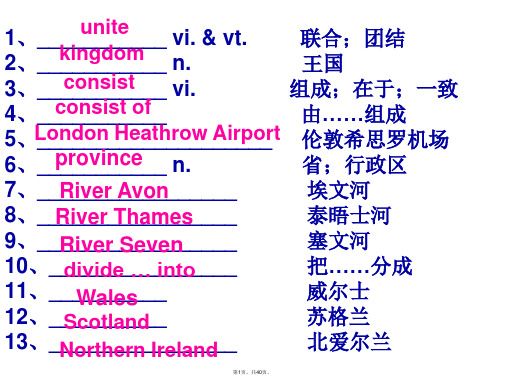
• 7.convenience n.方便;适宜;便利 • 1)为方便起见,我把参考书放在书桌旁。 • I keep my reference books near my desk • __f_o_r_c_o_n_v_e_n_i_e_n_ce_.____
• 2)for one's convenience/for the convenience of sb. • 为了某人的方便 • 为方便顾客我们备有座位。 • We have provided seats___fo_r_t_h_e_c_o_n_v_e_n_ie_n_c_e_o_f__
她经常与丈夫发生争执。
第12页,共40页。
• 活学活用
• A________of opinions arose over technical questions.
• A.conflict
B.war
• C.fight
D.battle
• 答案:A
第13页,共40页。
6.to one's credit为……带来荣誉; 值得赞扬;在……名下
6、__p_r_o_v_in_c_e___ n.
省;行政区
7、__R__iv_e_r_A__v_o_n______
埃文河
8、__R_i_v_e_r_T_h_a_m__e_s____
泰晤士河
9、__R__iv_e_r__S_e_v_e_n_____ 10、__d_iv_i_d_e_…___in_t_o____ 11、___W_a__le_s___ 12、__S_c_o_t_la_n_d__ 13、_N__o_rt_h_e_r_n_I_re_l_a_n_d__
句意为:老师进一步强调让学 生们在复述故事时不要漏掉任 何重要的细节。bring out 阐述, 使明白;let out 发出,泄露(秘 密等);leave out 遗漏;make out 理解,辨认出。
人教版高中英语必修五:Unit2 The United Kingdom 语法归纳 过去分词作宾语
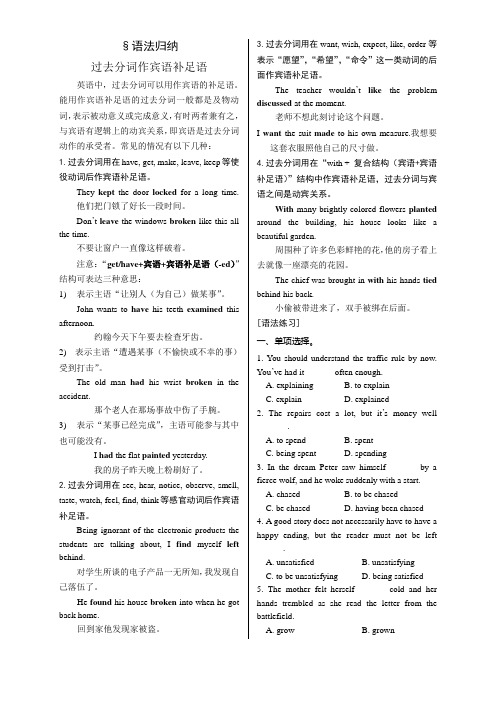
§语法归纳过去分词作宾语补足语英语中,过去分词可以用作宾语的补足语。
能用作宾语补足语的过去分词一般都是及物动词,表示被动意义或完成意义,有时两者兼有之,与宾语有逻辑上的动宾关系,即宾语是过去分词动作的承受者。
常见的情况有以下几种:1.过去分词用在have, get, make, leave, keep等使役动词后作宾语补足语。
They kept the door locked for a long time.他们把门锁了好长一段时间。
Don’t leave the windows broken like this all the time.不要让窗户一直像这样破着。
注意:“get/have+宾语+宾语补足语(-ed)”结构可表达三种意思:1)表示主语“让别人(为自己)做某事”。
John wants to have his teeth examined this afternoon.约翰今天下午要去检查牙齿。
2)2) 表示主语“遭遇某事(不愉快或不幸的事)受到打击”。
The old man had his wrist broken in the accident.那个老人在那场事故中伤了手腕。
3)表示“某事已经完成”,主语可能参与其中也可能没有。
I had the flat painted yesterday.我的房子昨天晚上粉刷好了。
2.过去分词用在see, hear, notice, observe, smell,taste, watch, feel, find, think等感官动词后作宾语补足语。
Being ignorant of the electronic products the students are talking about, I find myself leftbehind.对学生所谈的电子产品一无所知,我发现自己落伍了。
He found his house broken into when he got back home.回到家他发现家被盗。
第一编必修5Unit2TheUnitedKingdom学案含解析

Unit 2 The United Kingdom晨背分钟填词并背记Sightseeing in the United KingdomAfter the wedding,_my cousin and his wife went to the United_Kingdom for nationwide sightseeing. He faxed a letter to me in English yesterday. To my delight,_he no longer made any tense_error. And his description roughly clarified my questions about the UK—its currency,_its administration,_the institution which divides_it_into four provinces,_and the historical conflicts and quarrels when Southern Ireland broke_away_from the UK.Unwilling to leave_out any attraction, my cousin arranged his enjoyable journey carefully. One attractive place he visited was a castle in the countryside of Scotland, which lies near a port. It used to be the headquarters of the Communism_Union but broke_down during the war. Finding nothing could take_the_place_of this splendid_architecture,_people accomplished rebuilding it in 1952. It was to_their_credit that all furnished rooms are consistent with what they used to be. My cousin was thrilled by its collections consisting of statues plus royal uniforms folded in glass tanks. Though there was no possibility to buy some of these exhibits, it was convenient to take photos, which he sent me along with his fax.游览英国我的表弟和他妻子在举办了婚礼后到英国做全国旅游观光去了。
【高考】高三英语一轮复习Unit2TheUnitedKingdom教师用书新人教版必修5
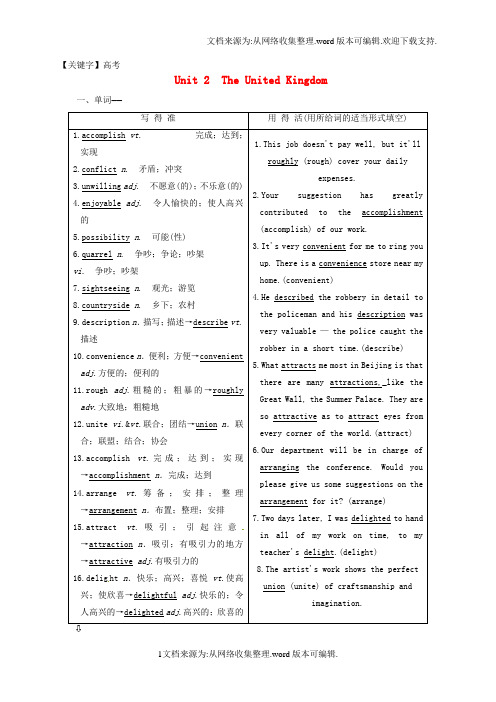
【关键字】高考Unit 2 The United Kingdom一、单词——写得准用得活(用所给词的适当形式填空)1.accomplish vt.完成;达到;实现2.conflict n. 矛盾;冲突3.unwilling adj. 不愿意(的);不乐意(的)4.enjoyable adj. 令人愉快的;使人高兴的5.possibility n. 可能(性)6.quarrel n. 争吵;争论;吵架vi.争吵;吵架7.sightseeing n. 观光;游览8.countryside n. 乡下;农村9.description n.描写;描述→describe vt.描述10.convenience n.便利;方便→convenient adj.方便的;便利的11.rough adj.粗糙的;粗暴的→roughly adv.大致地;粗糙地12.unite vi.&vt.联合;团结→union n.联合;联盟;结合;协会13.accomplish vt.完成;达到;实现→accomplishment n.完成;达到14.arrange vt.筹备;安排;整理→arrangement n.布置;整理;安排15.attract vt.吸引;引起注意→attraction n.吸引;有吸引力的地方→attractive adj.有吸引力的16.delig ht n.快乐;高兴;喜悦vt.使高兴;使欣喜→delightful adj.快乐的;令人高兴的→delighted adj.高兴的;欣喜的1.This job doesn't pay well, but it'llroughly (rough) cover your dailyexpenses.2.Your suggestion has greatly contributed to the accomplishment (accomplish) of our work.3.It's very convenient for me to ring you up. There is a convenience store near my home.(convenient)4.He described the robbery in detail to the policeman and his description was very valuable — the police caught the robber in a short time.(describe)5.What attracts me most in Beijing is that there are many attractions,_like the Great Wall, the Summer Palace. They are so attractive as to attract eyes from every corner of the world.(attract)6.Our department will be in charge of arranging the conference. Would you please give us some suggestions on the arrangement for it? (arrange)7.Two days later, I was delighted to hand in all of my work on time, to my teacher's delight.(delight)8.The artist's work shows the perfectunion (unite) of craftsmanship andimagination.⇩1.仅“一字之差”的单词①statue雕像→status身份②affect影响→effect影响;效果③adapt适应→adopt收养④sweat汗水→sweet甜的⑤content内容→context上下文⑥march前进→match比赛⑦expand扩张→expend花费2.前缀a高频表语形容词大全①alike 相同的;类似的②asleep 睡着的③alive 活的;有活力的④awake 醒着的⑤afraid 害怕的⑥ashamed 羞愧的3.“高兴”家族①delight n.&vt.(使)高兴;(使)喜悦delighted adj. 欣喜的;高兴的delightful adj. 令人高兴的②happy adj. 愉快的;高兴的happiness n. 快乐;幸福③joy n. 欢乐;高兴joyful adj. 快乐的;高兴的二、短语——写得准用得活(选用左栏短语填空)1.consis t_of 由……组成2.divide_..._into 把……分成3.refer_to 谈到;说到;参考;涉及4.break_away_(from) 挣脱(束缚);脱离5.take_the_place_of 代替6.to_one's_credit 为……带来荣誉;值得赞扬;在……名下7.leave_out 省去;遗漏;不考虑8.break_down (机器)损坏;破坏9.keep_one's_eyes_open 留心看10.in_memory_of 纪念……11.make_a_list_of 列……的清单12.at_one_time 曾经;一度1.The printing machines are always breaking_down,_which annoys him a lot.2.Our country is like a big family, consisting_of fiftysix nations.3.It is much to_her_credit that Mary continued to work in spite of all the difficulties.4.The town was named after Mr. Smith, in_memory_of his great contributions to its development.5.The young boy was so angry that he broke_away_from his mother and ran away.6.The most important words in this sentence have been left_out,_so it doesn't make any sense.7.The profe ssor has suddenly fallen ill.Who can take_the_place_of_him to give thelecture?⇩1.“代替”的表达法种种①take the place of②take one's place③replace sb./sth.④in place of 2.“to one's+n.”必备短语荟萃①to one's credit为……带来荣誉③to one's delight/joy 令某人高兴的是⑤to one's regret 使某人感到遗憾的是②to one's astonishment令某人惊奇的是④to one's disappointment 令某人失望的是⑥to one's shame 使某人惭愧的是背原句明句式学仿写1.You must keep your eyes open if youare going to make your trip to the United Kingdom enjoyable and worthwhile.要使你的英国之行愉快且值得,你就必须留心观察。
高二英语必修五Unit2TheUnitedKingdom教学

高二英语必修五Unit2 The United Kingdom教学设计乐东民族中学桂端饶Warming Up and Vocabulary----the First PeriodTeaching goals教学目标I Language goals语言目标 a. Important words and phrases 重点词汇和短语b. Important sentences 重点句子How many countries does the UK consist of?II. Ability goals 实力目标Enable the students to talk about great scientists.III. Emotional goals 情感目标1.Stimulate students’love and respect for great scientists.2.Develop students’ sense of cooperative learningTeaching aids 教具打算the MediaTeaching steps 教学过程Step1.Vocabulary Step2.Leading-in Step3. Warming up Step4. Pre—reading Step5. Language points(Look at the screen) Step6. Exercisesconsist vi. 组成, 一样divide vt. 安排, 分开puzzle n. 难题;谜v t.使迷惑clarify vt. 澄清, 阐明accomplish vt. 完成;达到;实现union n. 同盟; 联盟influence vt.影响, 变更break away摆脱;脱离construct vt.建立;构造;创立collection n.保藏品; 珍藏;收集convenience n.便利; 便利onwide adj. 全国性的; 全国范围的legal adj.法律的;合法的Leading-in 1)Do you know something about the United Kingdom?Warming up S tudents learn something about the UK according to the QUIZ.【学习新知】新新学案:1P19课时要点1,2,3 4【课内练习】新新学案:1P19-20练习【Homework】1,Review what they have learned. 2,Preview the reading passage .Reading and Comprehending-------The Second PeriodTeaching goals教学目标I Language goals语言目标 a. Important words and phrases 重点词汇和短语b. Important sentences 重点句子II. Ability goals 实力目标1.Develop students’ reading ability and let them learn different reading skills.2. Enable students to talk about something about theUK.III. Emotional goals 情感目标Develop students’ sense of cooperative learning Teaching aids 教具打算the MediaTeaching steps 教学过程Step1.Vocabulary Step2. Pre-reading Step3. Fast readingStep4. Careful reading Step5. Exercises Step6. Summary Step7. Homework.【Vocabulary】consist vi.组成, 一样puzzle n. 难题;谜v t.使迷惑divide vt. 安排, 分开clarify vt. 澄清, 阐明accomplish vt. 完成;达到;实现union n. 同盟; 联盟break away 摆脱;脱离influence vt.影响, 变更construct vt.建立;构造;创立collection n.保藏品; 珍藏;收集nationwide adj. 全国性的; 全国范围的convenience n.便利; 便利legal adj.法律的;合法的Pre-reading1.Can you name the capital cities of the UK?2. England can be divided into three main areas. Do you know what they are?3. What do you know about any cities or towns in the UK?Fast reading 1. What is the text mainly about?----A brief introduction to the UK about its foundation and development based on geography, history and culture, etc.2 How many countries make up the United Kingdom? What are they?----- Four. They are England, Wales, Scotland and Northern Ireland.Careful reading1 The Union Jack flag unites the flag of three countries in the United Kingdom, which country is left out? Why?2. What three countries does British Airways represent?England Scotland Northern Ireland3. Which group of invaders did not influence London? The Vikings didn’t influence London . Exercises新新学案:P18课文理解Homework:To Finish Exercise 1&2 on page 12.Language point-------The Third PeriodTeaching goals教学目标I Language goals语言目标 a. Important words and phrases 重点词汇和短语b. Important sentences 重点句子1.England can be divided into three main areas. 2。
高二年级必修 5 Unit 2 The United Kingdom考点聚焦
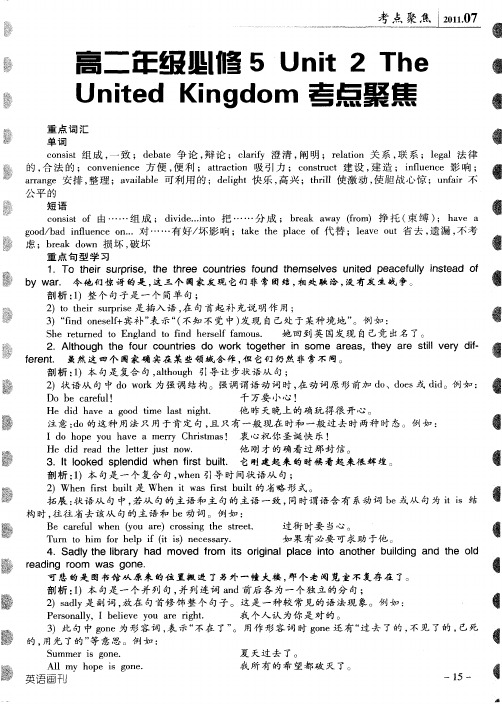
2.Al o g h o r c u ti s o wo k t g t e n s me r a .t e r t Iv r i t u h t e f u o n r d r o e h r i o a e s h y a e s i e y d f h e l -
虑 ;bek dw 损 坏 , 坏 ra o n 破 重 点 句 型 学 习
1 .T h i s r r e te t r e c u te o n h m s le ntd p a eul n t a f O t er u p i , h h e o n r s f u d te s i ev s u i e c f l ise d o e y
b r 令 他们 惊讶 的是 , 三个 国家发现 它们非 常 团结 , y wa. 这 相处 融洽 , 没有 发 生战 争。 剖析 :)整 个 句子是 一 个 简单 句 ; 1 2 o te up i 是 插入 语 , 句首起 补 充说 明作 用 ; )t h i srr e r s 在 3 f d o ee + )“ n n sl 宾补 ” 示“ 不知 不 觉 中) 现 自己处 于某种 境地 ” i f 表 ( 发 。例 如 :
考 点 聚焦 i0 . 10 2 17
高 二 年 级 mi i 2 Th l l Unt |5 e Unt d K g o 考点 聚 焦 i i d e n m
重 点 词 汇
单 词
c ni o s t组 成 , 致 ;d b t 争论 , 论 ;cai 澄清 , s 一 e ae 辩 l f ry 阐明 ;rl in 关 系 , 系 ;lgl法 律 ea o t 联 ea 的 , 法 的 ;c n e i c 方 便 , 利 ;a rc o 吸 引力 ;c nt c 合 o vne e n 便 tat n t i o s u t建 设 , 造 ;if e c r 建 n u n e影 响 ; l arn e安 排 , r g a 整理 ;aalbe可 利用 的 ;d l h vi l a ei t快乐 , g 高兴 ;tr l使 激动 , hi l 使胆 战 心惊 ;u fi na r不 公 平 的
- 1、下载文档前请自行甄别文档内容的完整性,平台不提供额外的编辑、内容补充、找答案等附加服务。
- 2、"仅部分预览"的文档,不可在线预览部分如存在完整性等问题,可反馈申请退款(可完整预览的文档不适用该条件!)。
- 3、如文档侵犯您的权益,请联系客服反馈,我们会尽快为您处理(人工客服工作时间:9:00-18:30)。
Teaching PlanInstructor: Cui Luoqiang Teaching content: Unit 2 A Brief Introduction of the United Kingdom IITeaching period : 2Teaching Amis:a.to help students be familiar with the history of the United Kingdomb.to help students have a command of the basic vocabulary and useful expression;c.to help students improve their speaking competence on the history of the UnitedKingdom.Difficult points :a.The earliest settlers of the UKb.The different invasions by the foreigners to the UKKey points:a.The dynasties of the United Kingdom;b.The significance of Norman conquestTeaching Allotment :Period 1 :ReviewWarm-upPrehistorical BritainsEarliest settlersGiant‘s CausewayRoman BritainPeriod 2:1. Anglo-Saxon invasion2. Viking invasion3. Norman conquestTeaching Procedure :Period 1 :ReviewT will lead the Ss to recall what they‘ve learned in the first class by asking them three questions :1. What‘s the national anthem of the UK ?2. Where is the UK?3. What‘s the landform of the UK?Warm-up :T will show some pictures of dfferernt periods of the UK , and let them guess the time of the picture.Prehistorical Britains :Prehistoric Britain was a period in the human occupation of Great Britain that extended throughout prehistory, ending with the Roman invasion of Britain in AD 43.Britain has been inhabited by Homo sapiens for tens of thousands of years.During the last Ice Age (around 6000 BC) Britain was cut off from the rest of Europe.By around 4000 BC, this new island was populated by Neolithic(新石器时代的)nomads .However, none of the pre-Roman inhabitants of Britain had any written language, so theirhistory, culture and way of life are known only through archaeological finds.Earliest Settlers (1) ---- The iberiansThe earliest settlers on the British IslesThey came from the Iberian Peninsula between 3,000 and 2,000 B.C.They were dark-haired people.They raised themselves from savagery onto the first steps of the civilized life.They were users of flint.They learnt to tame the dog, the sheep, the goat, the ox and the pig, and adopted the use of bronze and began farming.They were nomadic Stone Age hunters,Their social system was a tribal society.They left no written recordsThe only relics which gave evidence of their existence were stone monuments, the biggest of which was the Stonehenge, built by the Iberians on the Salisbury Plain about 3,500 years ago.Then T will show Ss a video of stonehenge building.Earliest Settlers (2) —The CeltsFrom 700 B.C. Celts came in several successive waves from the Upper Rhineland and began to inhabit British Isles.The fair-haired Celts imposed themselves as an aristocracy on the conquered tribes of Iberians throughout Britain and Ireland.So these people found refuge in the mountains to the north and west.At least two big waves of Celtic invasion can be distinguished: first the Gaels or Goidels, still found in Ireland and Scotland, came over as early as 600 B.C.; secondly the Cymric (威尔士的赛尔特语)and Brythons(布立吞人), still found in Wales, come over before 300 B.C.From the Brythons came the English name for Britain. In the end all the races mixed in blood by intermarriage.The Celts, like the Iberians before them, remained tribesmen or clansmen.They knew hunting, herding, weaving, bee keeping and the cultivation of wheat, oats and barley.There was no union among the tribes, and wars were frequent.Giant‘s causeway (巨人之路) (1)The 8th Natural Wonder of the World (suburb of Belfast)Sixty million years agoRoman BritainRoman Britain refers to those parts of the island of Great Britain controlled by the Roman Empire between AD 43 and 410.The Romans referred to their province as Britannia.Prior to the Roman invasion, Iron Age Britain already had cultural and economic links with Continental Europe, but the invaders introduced new developments in agriculture,urbanization, industry and architecture, leaving a legacy that is still apparent today.A province ofRoman EmpireLong time of communication between BritishIsles and the Continent.Julius Caesar‘s two invasion of Britain in 55and 54 BC.The conquest of Gaul and the punishment ofBritain supposed to help Gaul during the war.Caesar's contact was temporary. Nopermanent occupation.Emperor Claudius I invaded Britain in forcein AD 43: A difficult job.Two decades laterthe Romans had captured Anglesey, headquarters of the feared Druids,put down the revolt of Boudicca, queen of the Iceni.won the Battle of Mons Graupius, somewhere in Scotland, but the northern tribes provedhard to subdue.In 123, Hadrian's Wall, stretching 117 km from Solway Firth to the Tyne River, became the northern frontier.Hadrian‘s WallKing Hadrian (AD 76–138)Period: AD 122-130Length: 117 kmWidth: 3 mHeight: 5 to 6 mDefense: Physical frontierUNESCO: World Heritage Site (1987)Britain was a military outpost, taking 1/10 of the Roman army to hold it. Several towns attained a degree of Roman urban civilization, baths and amphitheaters, as well as people who spoke Latin and wore togas. Numerous villas——vast estates worked by slaves and featuring sumptuous noble dwellings—were also established. Beyond these, the countryside remained Celtic.The 3d and 4th centuries witnessed the decline of the Roman Empire.In 410 Rome abandoned Britain.After nearly four centuries of occupation, it left little that was permanent, yeta network of roads, still in use for 1400 years;a number of towns: London, York, and others bearing suffix –cester (Leicester, Worcester);Christianity;water and sewage systems.Period 2 :Anglo-Saxon Invasion⏹People:The ethnically and linguistically related peoples living in the south and east of theisland of Great Britain⏹Time: From around the early 5th century AD to the Norman conquest of 1066.⏹Language: closely related Germanic dialects.⏹Ethnical groups: Identified by Bede as the descendants of three powerful Germanic tribes,the Angles and the Saxons from today‘s northern Germany, and the Jutes from today‘s Denmark.Angles, Saxons and Jutes from the ContinentHeptarchy (Seven Kingdoms) (600–800)⏹Christianization of the Anglo-Saxon Kingdom began around 600 and was essentiallycomplete in the mid 8th century.⏹Throughout the 7th and 8th centuries, power exchanged between the larger kingdoms.⏹Bede records Aethelbert of Kent as being dominant at the close of the 6th century, butpower seems to have shifted northwards to the kingdom of Northumbria.⏹The so-called ‗Mercian Supremacy‘ dominated the 8th century, though again it was notconstant.⏹The word Heptarchy arose on the basis that the seven kingdoms of Northumbria, Mercia,Kent, East Anglia, Essex, Sussex and Wessex were the main polities of south Britain. Heptarchy (600–800)1. Northumberland2. Mercia3. East Anglia4. Essex5. Wessex6. Kent7. Sussex中国战国七雄:秦齐楚燕韩赵魏Viking Invasion (800–1066)⏹In the 9th centu ry, the Viking challenge grew to serious proportions. Alfred the Great‘svictory at Edington in 878 brought intermittent peace, but the Norsemen with the foundation of Jorvik gained a permanent foothold in Britain.⏹An important development of the 9th century was the rise of the Kingdom of Wessex, andby the end of his reign Alfred was recognized as overlord by several southern kingdoms.Æthelstan was the first king to achieve direct rulership of what is considered ―England.‖⏹Near the end of the 10th century, there was renewed Scandinavian interest in England,with the conquests of Sweyn of Denmark.Viking Invasion: The RouteNomadic tribes: yurtNorman ConquestIntroduction :⏹The Norman conquest of England began in 1066 AD with the invasion of the Kingdom ofEngland by William the Conqueror (Duke of Normandy), and his success at the Battle of Hastings resulted in Norman control of England.⏹The Norman Conquest was a pivotal event in English history for several reasons:1. This conquest linked England more closely with continental Europe through the introduction of a Norman aristocracy, thereby lessening Scandinavian influence.2. It created one of the most powerful monarchies in Europe and engendered a sophisticated governmental system.3. The conquest changed the English language and culture and set the stage for a rivalry with France that would continue intermittently until the 20th century.Normandy: Composition⏹Normandy (French: Normandie)1. Basse-Normandie2. Haute-Normandie3. The Channel Islandsa. Guernseyb. JerseyNorman Conquest: the cause⏹What was happening in England?⏹Viking attacks resumed in the late 10th century, and in 991 the King of England AethelredII agreed to marry Emma, the daughter of the Duke of Normandy, to cement a blood-tie alliance for help against the raiders.⏹When King Edward (son of Aethelred II ) died in 1066 with no child, and thus no directheir to the throne, a power vacuum arose in which several competing interests laid claim to the throne of England.⏹One was Harald III of Norway.Another claimant was William, Duke of Normandy because of his blood ties to Aethelrad through Aethelred‘s wife Emma.A third was the Earl of Wessex Harold Godwinson who had been elected king by the Witenagemot of England.Power vacuum after King Edward IIP o w e r v a c u u m a f t e r K i n g E d w a r d I IPreparation for the conquest⏹William had assembled an invasion fleet of approximately 600 ships and an army of7,000 men.⏹William had recruited soldiers from all of northern France, the Low Countries andGermany.⏹Many soldiers in his army were second- and third-born sons who had little or noinheritance under the laws of primogeniture ([praimə‗dʒenitʃə]长子身份).⏹William promised that if they brought their own horse, armour, and weapons to join him,they would be rewarded with lands and titles in the new realm.⏹William also gathered over 2,000 horses, transported across the channel in speciallyadapted horse transports.Crossing and LandingWilliamgathered his ships at Saint-Valery-sur-Sommeready to cross by 12 Augustdelayed by unfavourable weatherlanding at Pevensey in Sussex on 28 September, assembled a prefabricated wooden castle near HastingsA crucial delay:Just a few days after Harold‘s victory over the NorwegiansBad weather had done William a great favor:Had William landed in August as originally planned, Harold would have been waiting with a fresh and numerically superior force.Hasting Battle⏹Rushing south at the news of William‘s landing, Harold paused briefly at London togather more troops, then advanced to meet William.⏹They fought at the Battle of Hastings on 14 October. It was a close battle at first, but inthe fin al hours William‘s superiority in cavalry and archers proved decisive.⏹Harold was killed, along with his brothers Earl Gyrth and Earl Leofwine, and the Englisharmy fled.Occupation of London⏹William expected to receive the submission of the surviving English leaders,⏹Edgar Atheling was proclaimed king by the Witenagemot, with the support of EarlsEdwin and Morcar, Stigand, Archbishop of Canterbury, and Aldred, Archbishop of York.⏹William, who had received reinforcements from across the English Channel, thereforeadvanced, marching through Kent to London.⏹He was unable to storm London Bridge and therefore sought to reach the capital by amore circuitous route.⏹He marched west to link up with another Norman force near Dorking, Surrey. Thecombined armies then moved up the Thames valley to cross the river at Wallingford, Oxfordshire. While there, he received the submission of Stigand.⏹William then travelled northeast along the Chilterns, before advancing towards Londonfrom the northwest.⏹Having failed to muster an effective military response, Edgar‘s leading supporters losttheir nerve, and the English leaders surrendered to William at Berkhamstead.⏹William was acclaimed King of England and crowned by Aldred on December 25, 1066,in Westminster Abbey.Control of England⏹Soldiers rewarded: The Normans received from William lands and titles in return for theirservice in the invasion.⏹All land was the king‘s: William claimed ultimate possession of virtually all the land inEngland and asserted the right to dispose of it as he saw fit.⏹Land confiscation: William confiscated the lands of all English lords who had fought anddied with Harold and redistributed most of them to his Norman supporters.⏹These initial confiscations led to revolts, which resulted in more confiscations, in a cyclethat continued virtually unbroken for five years after the Battle of Hastings.⏹Fort and castle building: To put down and prevent further rebellions, the Normansconstructed a variety of forts and castles on an unprecedented scale.⏹Heir designation: If an English landholder died without issue, the King could designatethe heir, and often chose a successor from Normandy.⏹Inheritance control: William and his barons also exercised tighter control over inheritanceof property by widows and daughters, often forcing marriages to Normans.⏹No English in upper society: The Normans displaced the native aristocracy and tookcontrol of the upper ranks of society. By 1086, French names predominated even at the lower levels of the aristocracy.Kings of House of Norman, Anjou, PlantagenetKing John and the Greater Charter⏹King John succeeded his nephew Richard I in 1199.1) Defeated in a war with France and lost Normandy in 1204.Demanded more feudal taxes and army service to revenge himself on France.2) The lords became angry, marched to London and forced him to sign a long document on June 17th, 1215. The document is known as the Great Charter.3) torn up the Great Charter with the help of Pope.War broke out and finally John lost the war and died in 1216.⏹The Great Charter had three sets of provisions:1) that the king was not to exact extra payments from the feudal vassals (towns) without their consent;2) that laws were not to be modified by the arbitrary action of the king;3) that should the king attempt to free himself from law, the vassals had the right to force him to obey law, by civil war or otherwise.⏹Significances of the Great Charter1) Made in the interests of the feudal lords2) Granted to the townspeople freedom of trade and self-government.3) Political rise of merchants and craftsmen for the first timeBirth of Parliament⏹ Henry III (reign 1216-1272) was crowned at the age of 9.He hoped that he could defeat the lords and their Charter with the help of the Pope: (advisers, church post)⏹ Rebellion broke out with Simon V de Montfort (6th Earl of Leicester) as the leader.⏹ The lords forced the king to dismiss his foreign advisers and to accept their own councilof advisers, instead.de Montfort‘s new council took control of the treasury and all state officials, and then settled down to work their reforms.Simon called a parliament in 1265 after a battle in which Henry III was defeated and taken prisoner.In addition to the older group, there were two knights from each shire and two citizens from each town. It was known as the ―All Estates Parliament (各级议会).‖⏹ Edward I succeeded his father, Henry III, in 1272⏹ Conquered Wales and engaged in a long war with Scotland⏹ In constant need of money.⏹ In 1295, he summoned the ―All Estates Parliament‖—more than 400 members in all. Asthat Parliament was followed as a model, it became known in history as the ―Model Parliament (模范议会).‖⏹ Edward II succeeded his father in 1307⏹ A weak and lazy king⏹ Left the work of government to his household favorites⏹ A party of lords formed against him.⏹ Parliament made a plan to demand the public appointment of all state officials.⏹Parliament forced Edward II to hand over the crown to his son in 1327Significances of Norman ConquestEstablishment of Feudalism⏹Feudal Hierarchy:⏹The king was the sole and ultimate owner ofall land, which he gave to nobles and theChurch in return for military and otherservices.⏹The vassals could subdivide their fiefs intosmaller fiefs and bestow them upon their ownfollowers.⏹The king was the lord to his vassals, who inturn were lords to their knights.⏹Thus a new and more elaborate hierarchy ofnobility came into being.⏹Centralization of power⏹The king required not only his vassals but also the vassals of his vassals to take an oaththat they would be faithful to him against all other men.⏹duke, marquis, viscount, earl, baron⏹公爵,侯爵,伯爵,子爵,男爵Law reform and establishment of parliament⏹Before the arrival of Normans, Anglo-Saxon England had one of the most sophisticatedgovernmental systems in Western Europe.⏹All of England had been divided into administrative units called shires of roughlyuniform size and shape, which were run by officials known as ―shire reeve‖ or ―sheriff‖.⏹The shires tended to be somewhat autonomous and lacked coordinated control.⏹This sophisticated form of government was handed over to the Normans and grew evenstronger.⏹The Normans centralised the autonomous shire system.⏹The Domesday Book exemplifies the practical codification which enabled Normanassimilation of conquered territories through central control of a census.Language (1)⏹牛的肉是―牛肉‖,猪的肉就是―猪肉”⏹Old English ◊ Anglo-Normanpig pork (porc) ox beef (boeuf)deer venison (venison) calf veal (veal)sheep mutton (mutton)⏹Old English ◊ Anglo-Norman ◊ Modern Englishas the language of the ruling classes in England for nearly 300 years⏹Words borrowed from Old French Language1. Government and law:government, legislature, court2. Art and culture:dance, language, art3. Enjoyment of Life:leisure, fashion, cuisine⏹Anglo-Norman language:⏹from a sociolinguistic perspective⏹Upper class: French⏹Middle class: Anglo-Norman⏹Lower class: Old English⏹In the end, English won the competition, with a systematic variation.Anglo-Norman and French relations (1)⏹Anglo-Norman and French political relations became very complicated and somewhathostile after the Norman Conquest.⏹The Normans still retained control of the holdings in Normandy and were thus stillvassals to the King of France.⏹At the same time, they were their equals as King of England.⏹On the one hand they owed faith to the King of France, and on the other hand they did not,because they were peers.⏹ A crisis came in 1204 when French King Philip II seized all Norman and Angevinholdings in mainland France except Gascony. This led to the Hundred Years War when Anglo-Norman English kings tried to regain their dynastic holdings in France.⏹The Hundred Years' War (1337 to 1453)⏹The English kings‘ claims to the French throne.⏹The war was a series of conflicts and is commonly divided into three or four phases:1. the Edwardian War (1337–1360),2. the Caroline War (1369–1389),3. the Lancastrian War (1415–1429), and4. the slow decline of English fortunes after the appearance of Joan of Arc (1412–1431).⏹ResultsIt finally ended in the expulsion of the English from France.2. Conclusion (5mins)3. Assignments (5mins)To let students have a discussion on the following topics:a. What is the significance of Norman Conquest ?b. The influences of different invasions by the foreigners to the UK?Reference Book :1、《当代英国概况》肖惠云, 2003,上海外语教育出版社2、《当代英国社会与文化》王虹, 2003,上海外语教育出版社3、《英语国家概况》上外编,2004,上海外语教育出版社4、《现代英国大众文化》王皖强,2000,中国经济出版社5、《英国人》(英)杰里米帕克斯曼, 2000,上海译文出版社6、《美国文化与社会》王恩铭,2005,上海外语教育出版社Feedback :。
